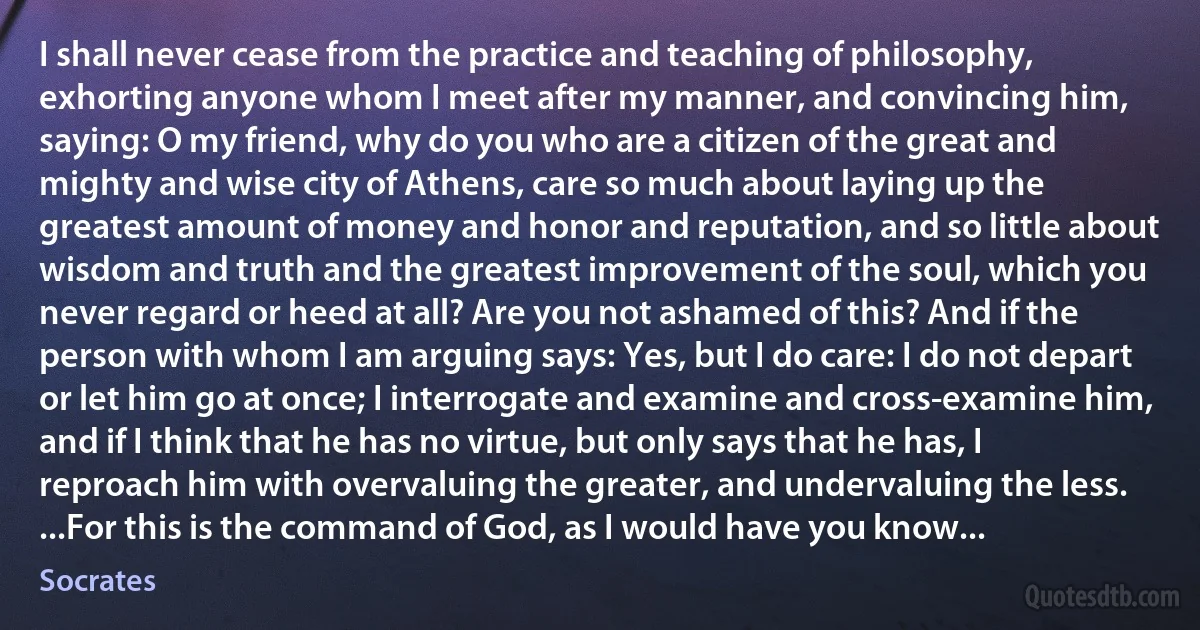
I shall never cease from the practice and teaching of philosophy, exhorting anyone whom I meet after my manner, and convincing him, saying: O my friend, why do you who are a citizen of the great and mighty and wise city of Athens, care so much about laying up the greatest amount of money and honor and reputation, and so little about wisdom and truth and the greatest improvement of the soul, which you never regard or heed at all? Are you not ashamed of this? And if the person with whom I am arguing says: Yes, but I do care: I do not depart or let him go at once; I interrogate and examine and cross-examine him, and if I think that he has no virtue, but only says that he has, I reproach him with overvaluing the greater, and undervaluing the less. ...For this is the command of God, as I would have you know...
SocratesRelated topics
anyone care cease city command friend great heed honor improvement interrogate less meet mighty money once person practice reputation saying soul teaching think truth virtue wisdom wise yesRelated quotes
Dear Sir, - I have truly, I must say, written three times, and now hesitate; for did I know your son's works, or, as you say, his gifted merits yet even then I would rather advise you to think well, and not be carried away by the admiration which any friendly hopes (which ardent friends to early talent) may assume: they know not the difficulties or the necessities of the culture of the Fine Arts generally speaking. In regard to yourself, it is you alone can judge how far you are inclined to support him during perhaps a long period of expense; and particularly if you look towards tuition, the more so; for it cannot insure success (however much it may facilitate practice), and therefore it behooves you to weigh well the means in your power before you embark in a profession which requires more care, assiduity, and perseverance than any person can guarantee.

J. M. W. Turner
With regard to the abuse of authority, this also may come about in two ways. First, when what is ordered by an authority is opposed to the object for which that authority was constituted (if, for example, some sinful action is commanded or one which is contrary to virtue, when it is precisely for the protection and fostering of virtue that authority is instituted). In such a case, not only is there no obligation to obey the authority, but one is obliged to disobey it, as did the holy martyrs who suffered death rather than obey the impious commands of tyrants. Secondly, when those who bear such authority command things which exceed the competence of such authority; as, for example, when a master demands payment from a servant which the latter is not bound to make, and other similar cases. In this instance the subject is free to obey or disobey.

Thomas Aquinas
Lead your child by the hand to the great scenes of nature; teach him on the mountain and in the valley. There he will listen better to your teaching; the liberty will give him greater force to surmount difficulties. But in these hours of liberty it should be nature that teaches rather than you. Do not allow yourself to prevail for the pleasure of success in your teaching; or to desire in the least to proceed when nature diverts him; do not take away in the least the pleasure which she offers him. Let him completely realize that it is nature that teaches, and that you, with your art, do nothing more than walk quietly at her side. When he hears a bird warble or an insect hum on a leaf, then cease your talk; the bird and the insect are teaching; your business is then to be silent.

Johann Heinrich Pestalozzi
My father's moral inculcations were at all times mainly those of the "Socratici viri;" justice, temperance (to which he gave a very extended application), veracity, perseverance, readiness to encounter pain and especially labour; regard for the public good; estimation of persons according to their merits, and of things according to their intrinsic usefulness; a life of exertion in contradiction to one of self-indulgent sloth. These and other moralities he conveyed in brief sentences, uttered as occasion arose, of grave exhortation, or stern reprobation and contemp. But though direct moral teaching does much, indirect does more; and the effect my father produced on my character, did not depend solely on what he said or did with that direct object, but also, and still more, on what manner of man he was.

John Stuart Mill
Verily as there is a property in God of ruth and pity, so verily there is a property in God of thirst and longing. (And of the virtue of this longing in Christ, we have to long again to Him: without which no soul cometh to Heaven.) And this property of longing and thirst cometh of the endless Goodness of God, even as the property of pity cometh of His endless Goodness. And though longing and pity are two sundry properties, as to my sight, in this standeth the point of the Spiritual Thirst: which is desire in Him as long as we be in need, drawing us up to His bliss. And all this was seen in the Shewing of Compassion: for that shall cease on Doomsday.
Thus He hath ruth and compassion on us, and He hath longing to have us; but His wisdom and His love suffereth not the end to come till the best time.

Julian of Norwich
